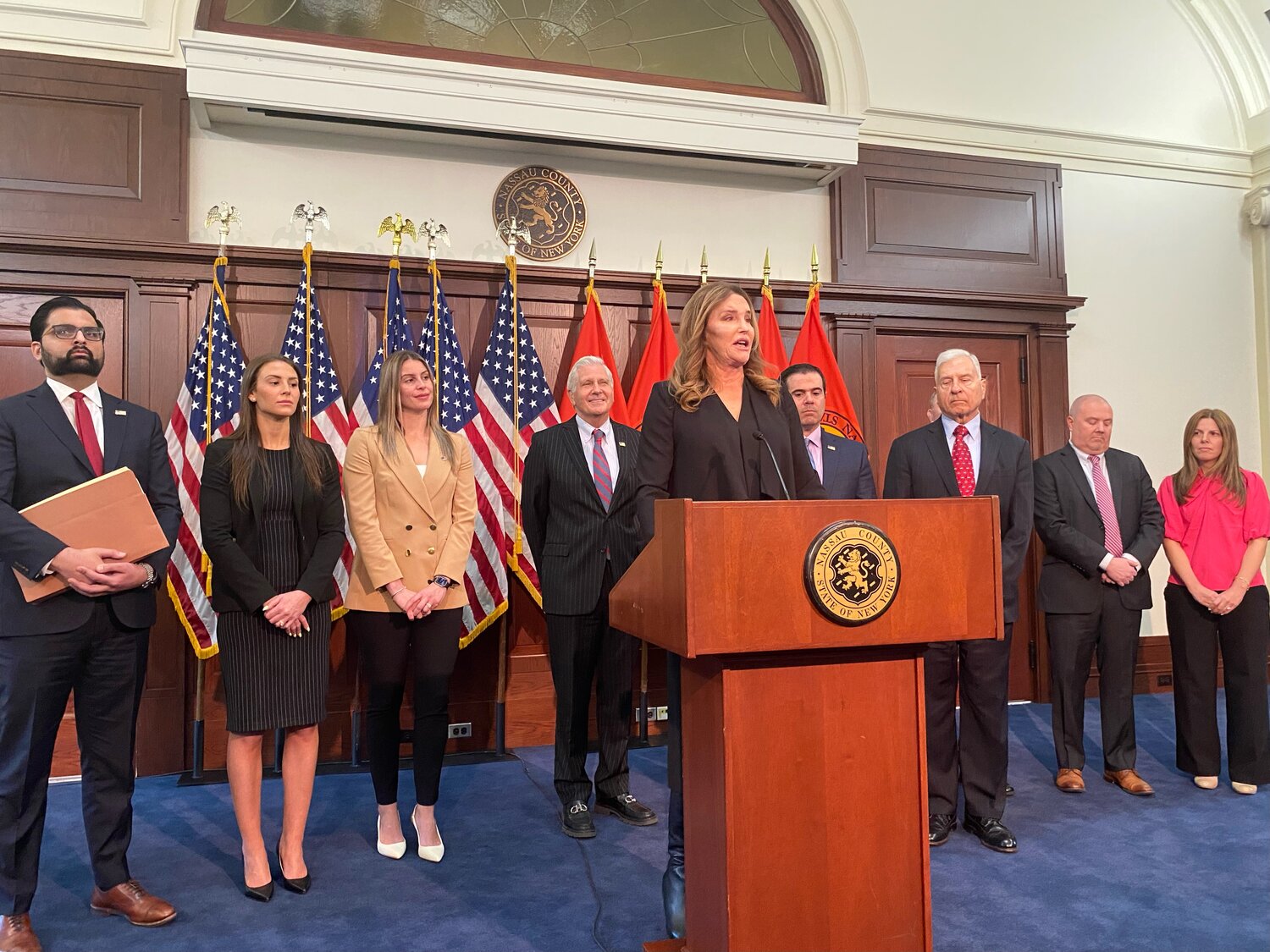Caitlyn Jenner backs Bruce Blakeman’s transgender athlete ban
Caitlyn Jenner wouldn’t be allowed to participate in women-focused team sports on Nassau County property — but she’s OK with that.
The transgender former Olympic gold metal-winning decathlete joined County Executive Bruce Blakeman in Mineola Monday to express her support for Blakeman’s ban on transgender girls and women participating in teams geared exclusively toward girls and women on county property.
“I have empathy for all LGBT people, and I have a thorough understanding of all the struggles, no matter how different our circumstances,” Jenner said.
Jenner — who transitioned into a woman in 2015 — had a six-year career in the Olympic men’s decathlon, taking the gold at the 1976 Summer Olympics in Montreal. Before, Jenner played college football for the Graceland Yellow Jackets.
She recounted her time training and competing in the Olympics, and the saliva tests that the International Olympic Committee used to test for biological male and femaleness.
“It is done in a matter to protect the integrity of the competition,” Jenner said. “Today, the problem is even more clear. Trans women are competing against women, taking valuable opportunities from the law-protected class under Title IX, and causing physical harm.”
Jenner talked about a North Carolina high school volleyball player who said she was injured after a transgender opponent spiked the ball on her during a game.
“In volleyball, we think of it as a non-contact sport,” Jenner said, “but these are the statistics.”
The women’s net is 7.5 inches lower than the men’s net, making it easier to spike, she said. Men also tend to be 8 inches taller than women on the volleyball scene, and can jump 6 inches higher.
“The average spike for the men, a good spike, is 82 miles an hour,” Jenner said. “The average spike for women, 64 miles per hour, 30 percent greater velocity playing a man. And that’s why we have to protect women’s sports.”
Since her transition, Jenner has become a transgender rights activist, and has starred in her own reality television show, “I Am Cait,” documenting her transition.
Jenner ran as a Republican for California governor during the 2021 unsuccessful recall election, earning just 1 percent of the vote.
But not everyone agrees with what Jenner stands for — even in the LGBTQ+ community. David Kilmnick, president and founder of Long Island-based LGBT Network, said Jenner’s support of Blakeman’s executive order is a contradiction to her own identity.
“Embracing policies or ideologies that undermine the rights and dignity of LGBTQ+ individuals is not only hypocritical, but also harmful,” Kilmnick said, in a statement. “Jenner’s alignment with such positions not only perpetuates discrimination, but also adds fuel to the rising number of violent and hate incidents committed against transgender individuals.”
Blakeman signed his executive order last month demanding sports, leagues, organizations, teams, programs or sport entities operating in county facilities designate themselves based on male, female or co-ed, and then only accept athletes who meet that criteria according to what was originally listed on their birth certificate.
While those born male would not be allowed to participate in female teams, the order does not ban females from joining male teams.
“My executive order has one goal, and that is to make sure that competition is fair and safe in Nassau County,” Blakeman said. “That we protect women and girls, so that when they train for an athletic competition — when they train to get on a team, when they’re in a meet or tournament — they have the ability to compete fairly.”
Attorney General Letitia James sent a cease-and-desist letter to Blakeman earlier this month, demanding he rescind his executive order, calling it not only transphobic, but also illegal under the state’s human rights and civil rights laws.
Blakeman responded a few days later by joining Mark Mullen, a Nassau County parent of a female athlete, to file a federal lawsuit contesting the order.






